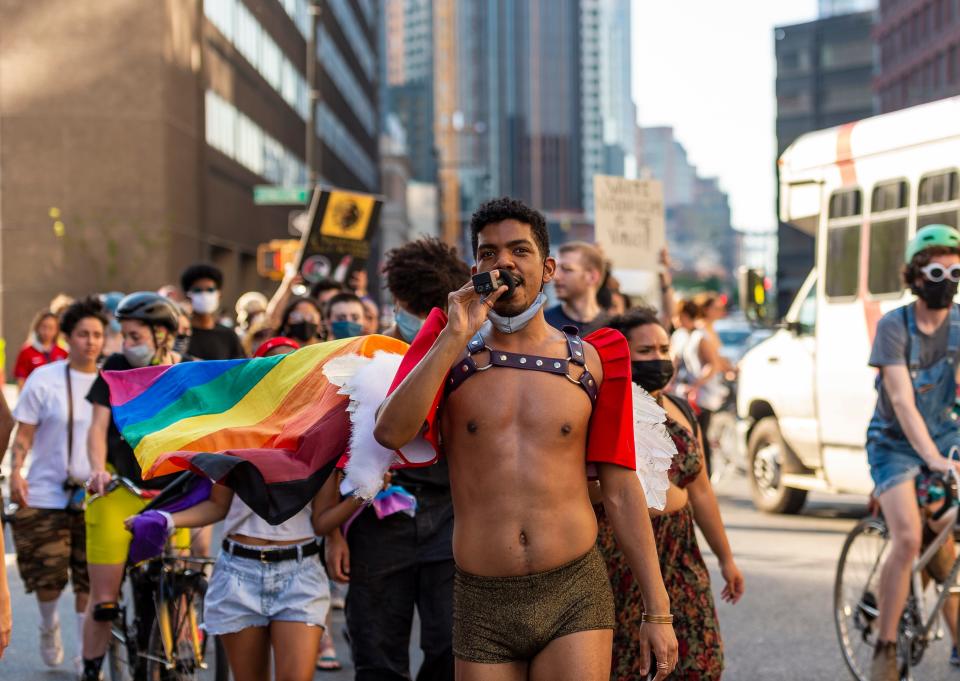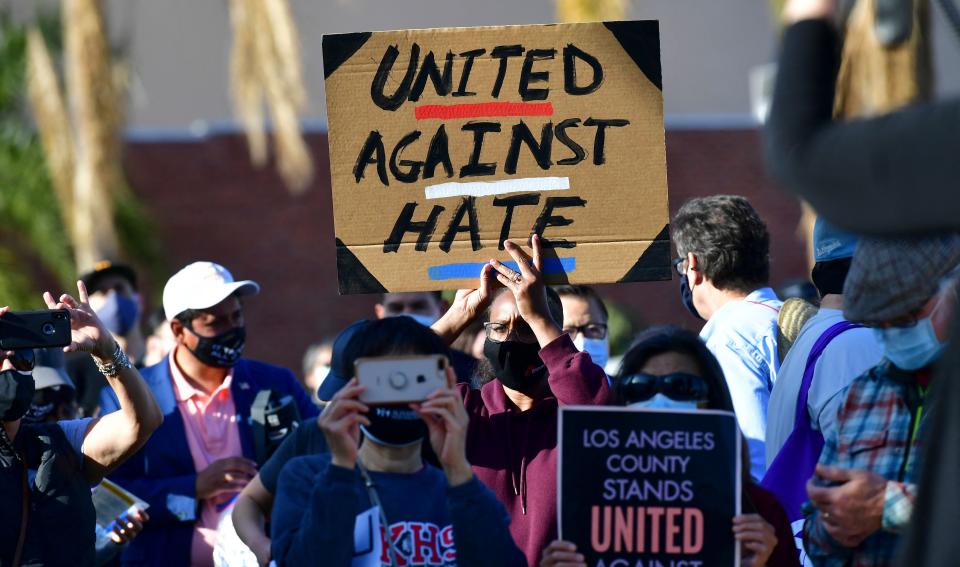Amid a rise in hate crimes, Black and Asian Americans are standing together: 'Solidarity is the answer'
Rohan Zhou-Lee led a crowd of hundreds over the summer in Brooklyn, microphone in hand and Pride flag billowing in the wind.
“Justice for Asians! Justice for Black people!” Zhou-Lee sang with fellow protesters. Some carried instruments and bells. Others waved signs with the words, "This is solidarity" and "We stand with Black lives."
The Pride rally was one of several events in the past year led by the Blasian March, an organization that Zhou-Lee created to encourage Black and Asian solidarity. The event highlighted recent violence against Black and Asian American communities.
In 2020, hate crime reports in the U.S. spiked to their highest level in 12 years, largely triggered by a surge in crimes against Black and Asian Americans, according to an FBI report released late last month.
Amid this rise in hate crimes, Black and Asian activists have intensified the rallying cry for solidarity between the two groups. The activism builds on decades of cross-racial organizing and a history experts say needs more exposure.
Seeing the pain Black and Asian American communities have suffered in the past year, Zhou-Lee wanted “'Blasians" – people who are Black and Asian – to be part of the conversation and to build bridges for collective, communal power for Black and Asian communities, they said.
“We’re telling people, solidarity is the answer," Zhou-Lee said. "Education and mutual celebration is the answer. We do this together. We free each other together."
US history is complex: Scholars say this is the right way to teach about slavery, racism

Hate crimes surge to highest level over a decade, FBI reports
When Jaimee Swift's Vietnamese American friend told her that she hadn’t been outside for days last year, Swift was confused.
That is, until that friend told Swift she stayed inside out of fear of anti-Asian hate crimes that experts say have been largely driven by racist reactions to the COVID-19 pandemic, including politicians such as former President Donald Trump using racial slurs for the virus.
More than 7,700 criminal hate crimes motivated by "bias toward race, ethnicity, ancestry, religion, sexual orientation, disability, gender, and gender identity" were reported last year, an increase of about 450 incidents since the year before, FBI data shows.
In 2020, hate crimes targeting Black people rose to 2,755 from 1,930 the previous year, while attacks against Asians climbed to 274 from 161.
The findings reflect research by the Center for the Study of Hate & Extremism at California State University, San Bernardino, said center director Brian Levin. The numbers reported by the FBI might even fall short, he said.
“The headlines say 'highest in 12 years,' but if you factor in the limitations of the FBI report, it may actually be more like the highest since 2001,” said Levin, a criminal justice professor.
Levin pointed to discrepancies between the numbers of hate crimes local agencies reported publicly and what is reflected in the report’s state-by-state breakdowns, possibly due to differences in how various agencies defined a hate crime.
“It's really hard to define what a hate crime is,” said Russell Jeung, co-founder of Stop AAPI Hate, which has been tracking anti-Asian hate incidents since the beginning of the COVID-19 pandemic. “You have to discern a person's motivation and then prove that motivation was based on race."

Obstacles, including language barriers, cultural resistance to reporting and distrust of law enforcement, also lead to undercounts in hate crime reporting, said Jeung, a professor of Asian American Studies at San Francisco State University.
While racist rhetoric regarding the pandemic has fueled anti-Asian hate crimes, Jeung said the increase in hate crimes across the board may be due to a wide range of factors, including the uncertainty and difficulties of the past year leading people to look to other communities as scapegoats for the problems they face.
The conversation Swift had with her friend compelled her to reach out to the the Asian American Feminist Collective. Swift, 30, is the Washington, D.C.-based director of Black Women Radicals, and the two groups have since launched the Black and Asian Feminist Solidarities Project, a monthly column that invites Black and Asian feminists to write about solidarity.
"I believe that we need each other and need to learn from one another now more than ever," she told them.
“The pandemic, the hate and violence we've seen have shown us that our society is broken,” she said. “People are wanting to see if we can build something new together by practicing solidarity."
After Atlanta spa shootings, many Americans call for unity against racism
'Make the most of this moment': Asian American activists are demanding equal civil rights, better education in schools
New movements honor long legacy of Black and Asian solidarity
Experts say Black and Asian activists have a long history of working together, dating back to 1869, when abolitionist Frederick Douglass advocated against restricting Chinese and Japanese migration into America.
Black and Asian American activists also worked to combat racism, colonialism and imperialism in the 1960s and 1970s, particularly during demonstrations against the Vietnam War, according to Diane C. Fujino, an Asian American studies professor at University of California Santa Barbara.
Women of color involved in the feminist movement were also instrumental in linking the issues of racism and sexism, a call for intersectionality that persists today, she added.
She pointed to the work of Grace Lee Boggs, a Chinese American who worked with her husband, Black activist James Boggs, in support of the Black Power movement. And to Yuri Kochiyama, a Japanese American civil rights activist who joined Malcolm X’s Organization of Afro-American Unity.
"All of this builds on this prior history," Fujino said. "Sometimes it's the people who were the 60s and 70s activists who are interacting with young people and learning from them."
Lasting trauma of anti-Black violence: George's Floyd's death was a reminder that racial violence isn’t new
Swift said she was inspired by Audre Lorde's organizing work with Maori women in Auckland, New Zealand, and the "Azalea Newsletter: Conversations from Third World Lesbian Writers," which was produced by a collective of Black and Asian writers, as well as Latina and Chicana authors.
"We come from very long legacies of Black and Asian women and women at the intersection between these communities working together," she said. "They laid the foundation for us."
But this history has often been overshadowed by moments of conflict fueled by racist stereotypes and social issues that pit the two communities against each other, according to experts.
For example, amid the 1992 Los Angeles riots sparked by the acquittal of the white police officers who beat Rodney King, media reports focused heavily on violent encounters between Black and Korean communities in the area, Fujino said. But in the aftermath, community members came together to educate one another and improve conditions, which got less media attention.
This played out more recently as anti-Asian attacks rose amid the pandemic and videos showing assailants that appeared to be Black circulated widely, despite a 2021 study finding 75% of offenders in anti-Asian hate crimes between 1992-2014 were white, according to Janelle Wong, a professor of American and Asian American studies at the University of Maryland.
While a perpetrator's race was rarely included in media reports in 2020, more than 77% of suspects were explicitly identified as white, according to an analysis of media reports of anti-Asian incidents last year by the University of Michigan Virulent Hate Project.
Wong said videos of young Black men violently shoving older Asian Americans may have been so widely shared in part because they reinforce stereotypes that Black people are more likely to be criminals. She said the videos shifted focus from the origins of the violence, including Trump and other prominent Republicans using racist terms to describe the coronavirus.
“We didn’t get to the root of the problem of anti-Asian violence ... because those (videos) became an easy distraction from white supremacy,” Wong said.
This is America Newsletter: Stop gaslighting me with the Asian 'model minority' myth
Meanwhile, the “model minority myth,” or the belief that Asian Americans are inherently better at achieving success and overcoming adversity than other ethnic groups, has long been used to obscure anti-Asian racism and drive a wedge between minority communities, Fujino said.
“We see the solidification, the crystallization of Asian Americans as model minorities at the exact moment the Black Power movement is becoming more radical and more militant,” Fujino said. “That model minority myth is used to discipline Black struggle and it’s used to discipline dissent, to make an argument that activism is not needed.”
Fujino said that in many communities, Asian Americans and immigrants became merchants in predominantly Black areas, fostering economic tensions over scarce resources, which some experts suggest can manifest as anti-immigrant sentiment and racism. Researchers have said cultural and linguistic tensions may also be at play.
“These tensions are real,” said Fujino. “One of the ways that really is useful to improving conditions is to be able to address the social problems that underlie what appear to be racial conflicts.”
'Not going away': More than 9K anti-Asian hate incidents since COVID pandemic began, report says
'Siblings in this struggle'
From kindergarten through graduate school, Swift, from Black Women Radicals, said she never once learned about this history, which she says has been erased through lack of education in schools and limited media coverage.
Swift said not knowing this history of solidarity makes Black and Asian Americans more vulnerable to being manipulated by mythologies created by oppressive structures that seek to divide communities of color.
"When we know our histories, our relationships become stronger," she said. "It becomes harder to divide us and harder to feed us the myth that we are enemies when, really, we are siblings in this struggle."
Bianca Mabute-Louie, a Chinese American who runs anti-racism workshops, said communities of color are often told they must compete over scarce resources.
"If you take a step back, it's the state or the city intentionally divesting from communities of color because they don't see them as worth investing in," she said.
She added: "Keeping people fighting each other and scapegoating one another keeps us distracted from the real enemy, which is white supremacy and systemic racism."
That's why Mabute-Louie focuses on solidarity and the history of cross-racial organizing in the workshops she organizes for nonprofits, schools and businesses. She also makes zines highlighting stories in the history of Black and Asian solidarity.
The erasure of this history is "a subtle form of violence" that threatens the solidarity work of Black and Asian community organizers, Zhou-Lee said.
"When folks don't know their history, they don't know their trauma," Zhou-Lee said. "If you don't know your trauma, it's that much easier for white society to manipulate us, to keep us in the dark of who is truly pulling the strings."
Follow N'dea Yancey-Bragg on Twitter at @NdeaYanceyBragg. Contact News Now Reporter Christine Fernando at cfernando@usatoday.com or follow her on Twitter at @christinetfern.
Racism as public health crisis: Hundreds of communities declared racism a public health crisis. What's happened since?
'On our own terms': How scholars of color are correcting the narrative of national tragedies
This article originally appeared on USA TODAY: Rise in hate crimes: Black, Asian Americans promoting solidarity

